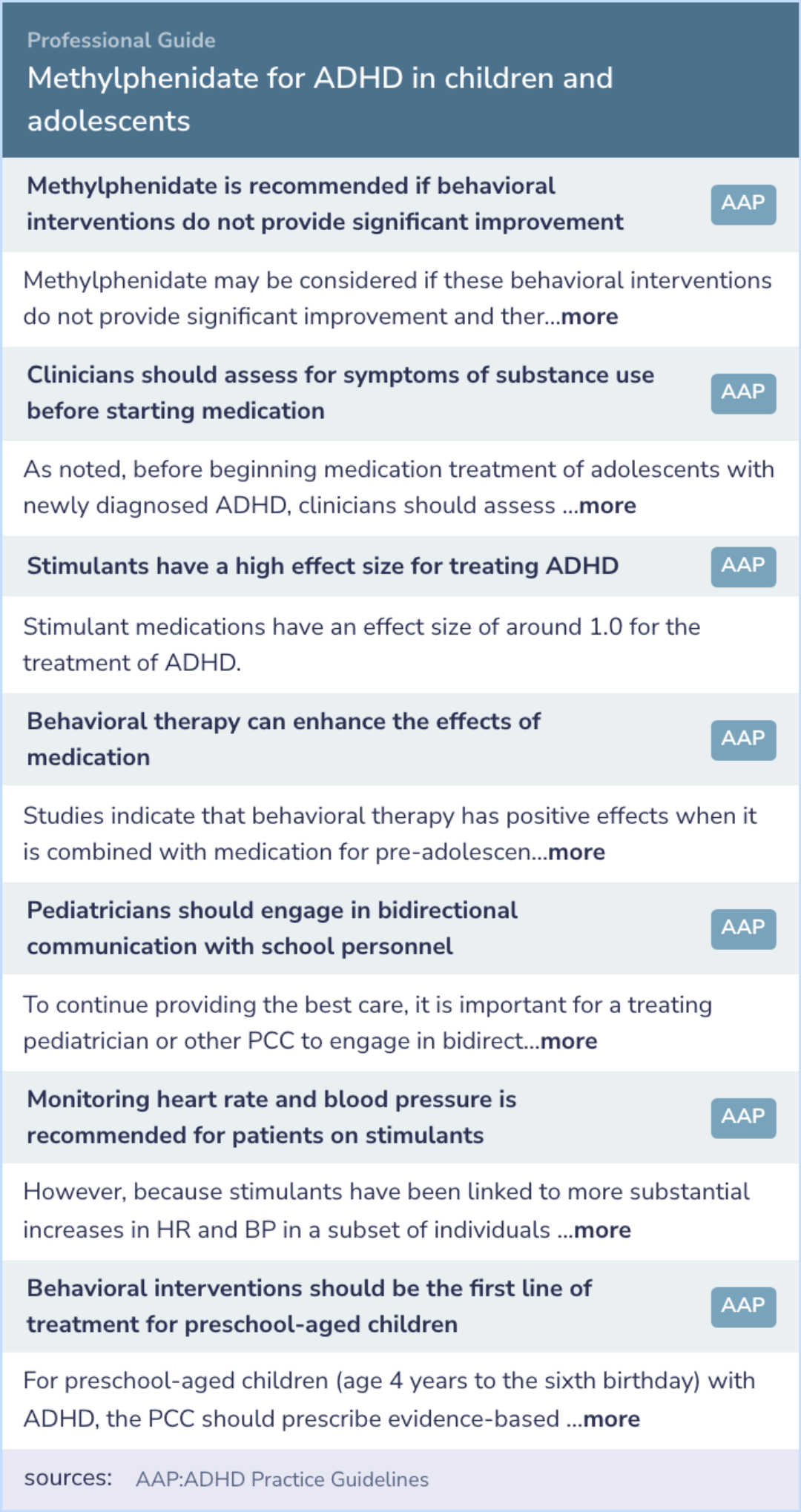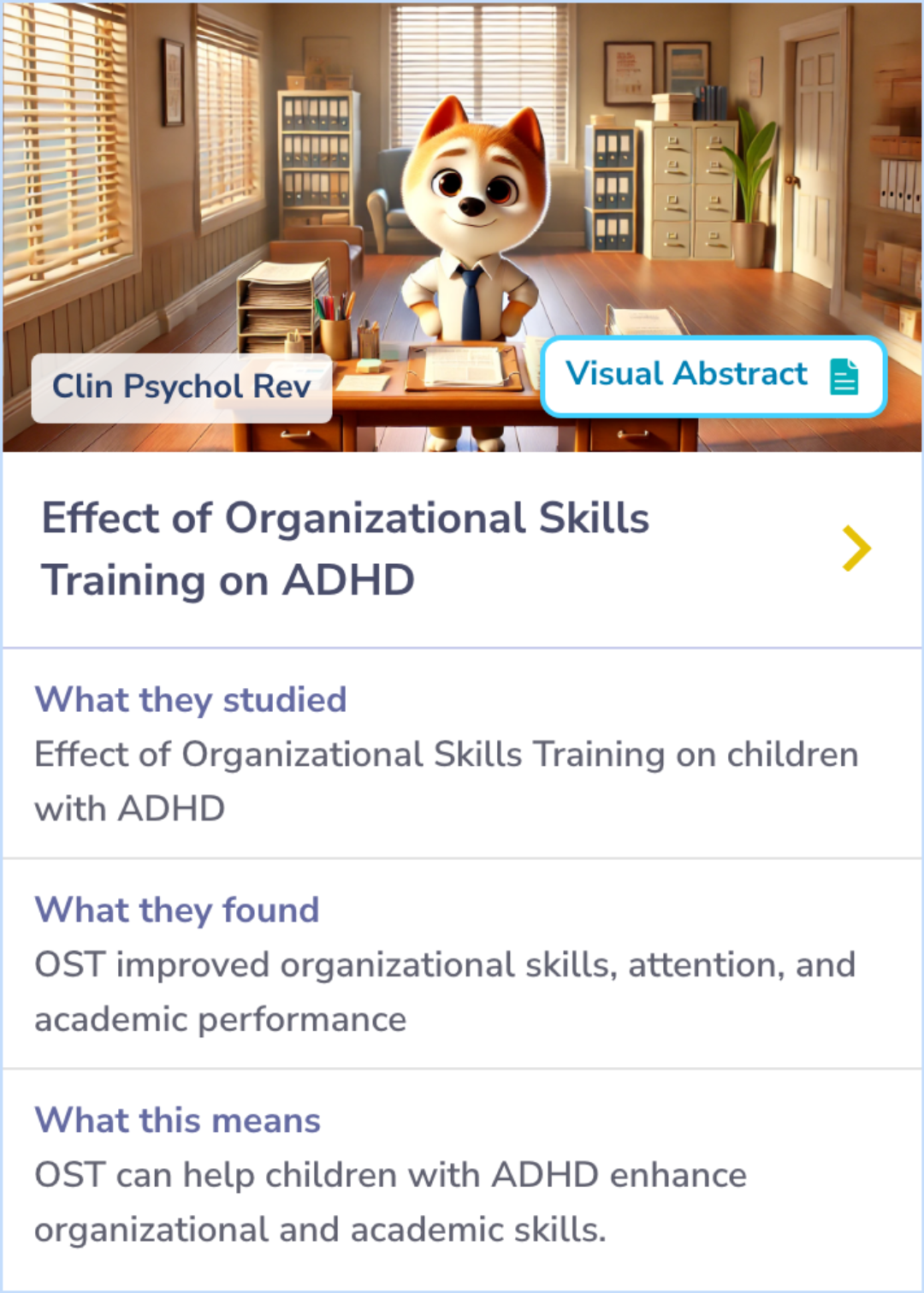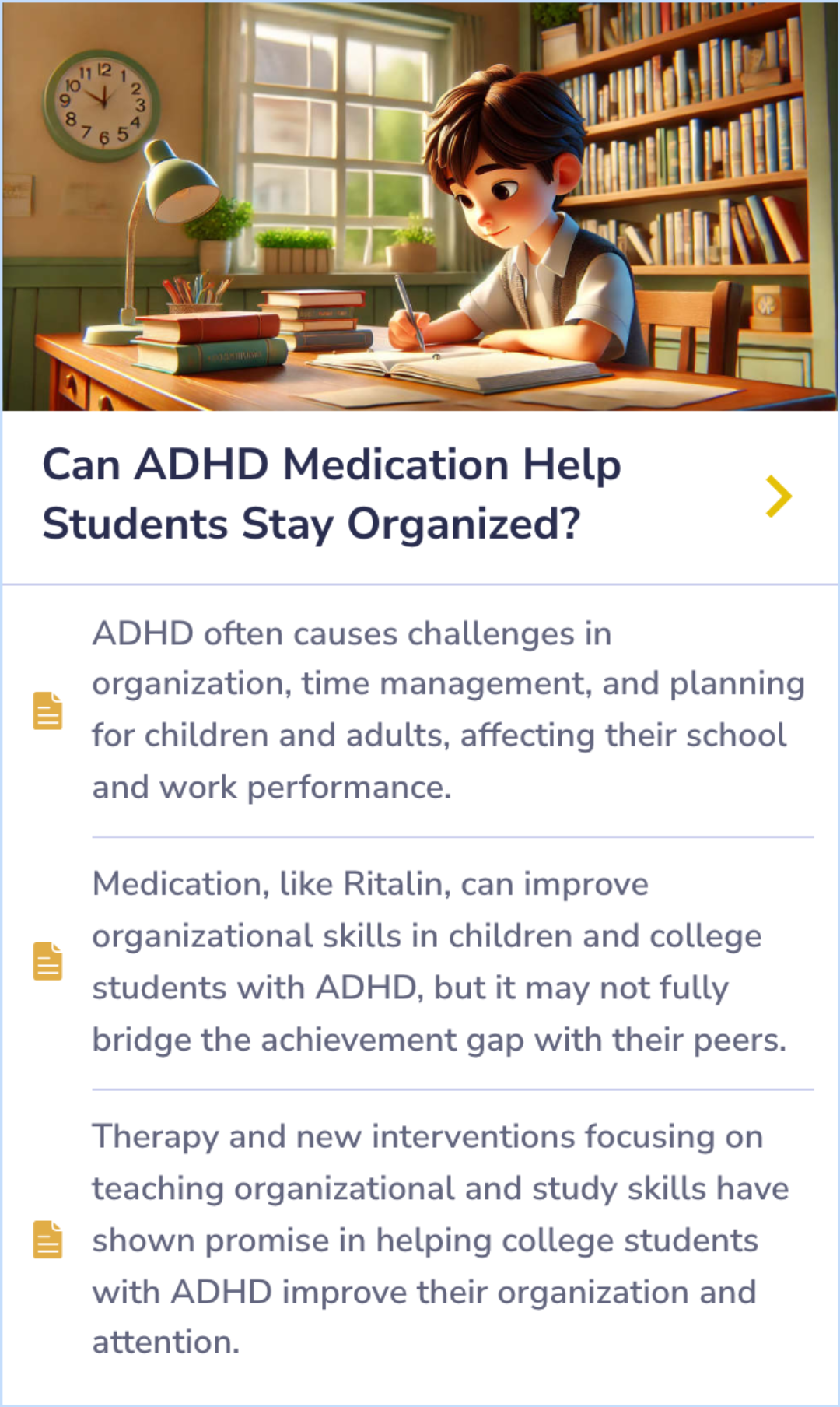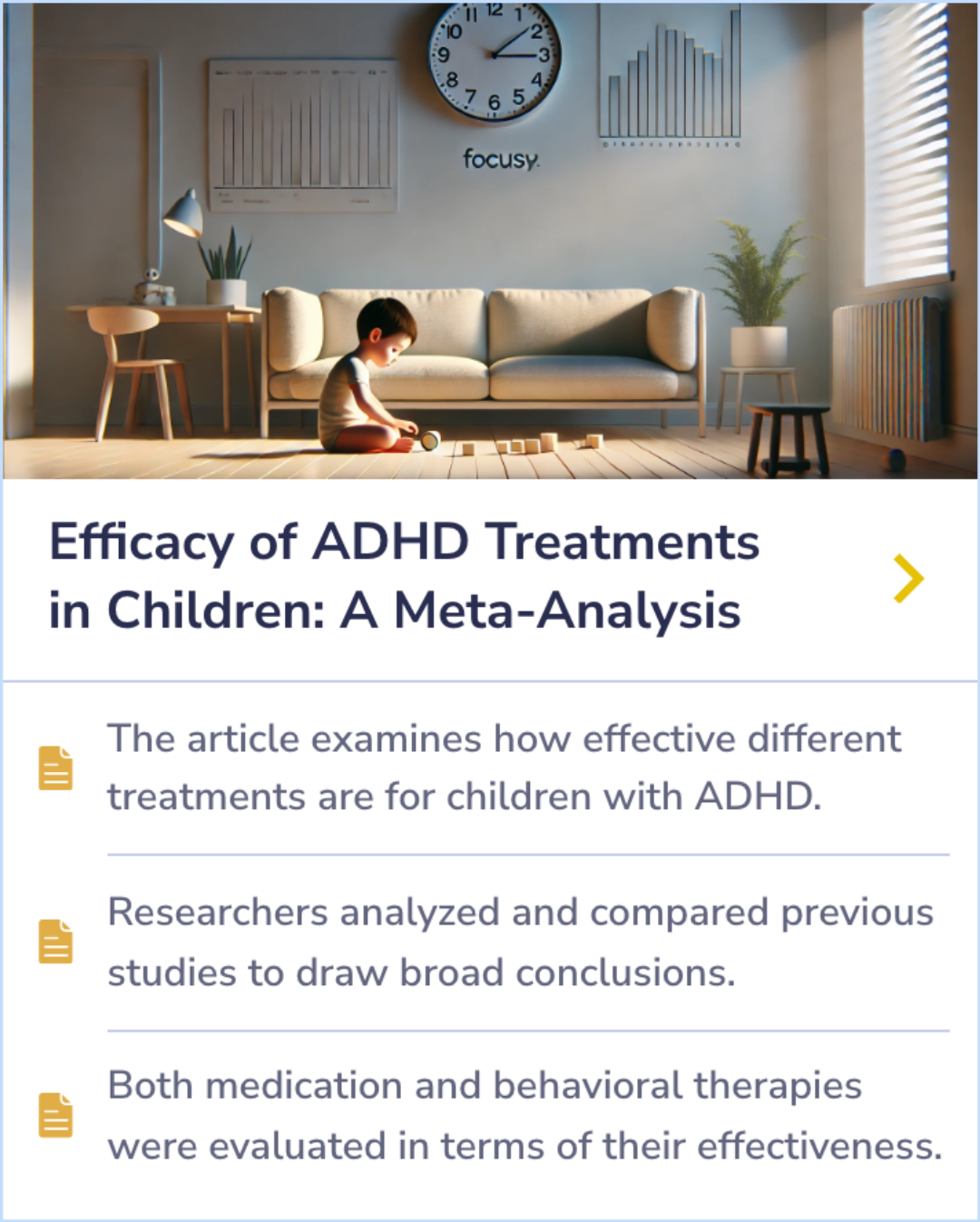Ritalin Paper Database
Visual Abstract
Methylphenidate for attention-deficit/hyperactivity disorder in children and adolescents: Cochrane systematic review with meta-analyses and trial sequential analyses of randomised clinical trials
Methylphenidate for ADHD in children and adolescents
September 9, 2024
author
Storebø OJ, Krogh HB, Ramstad E, Moreira-Maia CR, Holmskov M, Skoog M, Nilausen TD, Magnusson FL, Zwi M, Gillies D, Rosendal S, Groth C, Rasmussen KB, Gauci D, Kirubakaran R, Forsbøl B, Simonsen E, Gluud C
journal
BMJ
Date Published
2015 Nov 25
Why link to a visual abstract?
What is a visual abstract?
Original
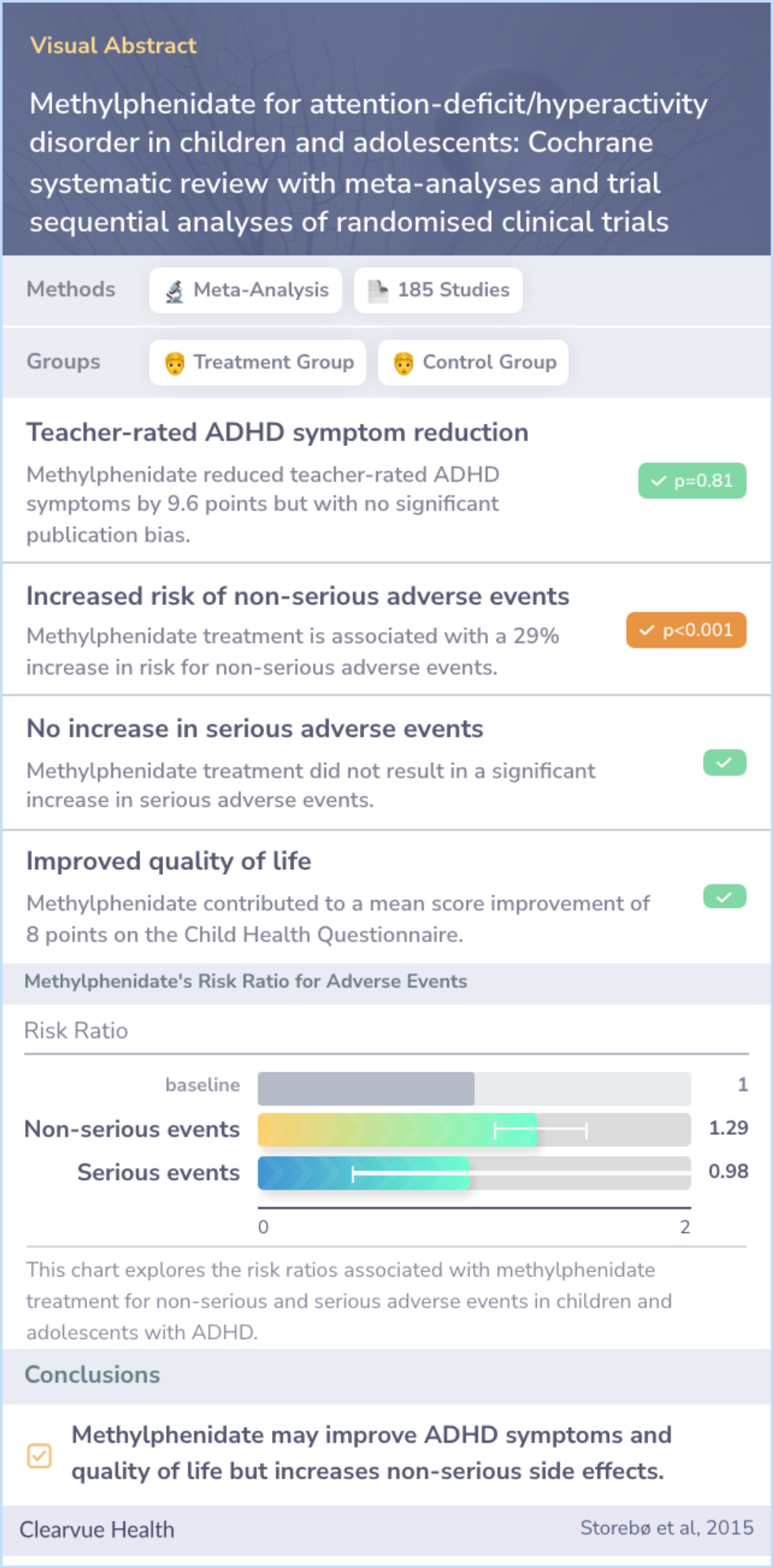
Study Summary
🔬
What They Studied
Is methylphenidate beneficial or harmful for the treatment of ADHD in children and adolescents?
💡
What They Found
Methylphenidate may improve ADHD symptoms and quality of life, but it increases the risk of non-serious side effects.
📚
What This Means
The findings suggest that while methylphenidate may help with ADHD symptoms and quality of life, it is associated with non-serious side effects. This aligns with current evidence showing its use in ADHD treatment, recognizing the need for careful side effect monitoring.
Study Summary
Background
Abstract: background
Is methylphenidate beneficial or harmful for the treatment of attention-deficit/hyperactivity disorder (ADHD) in children and adolescents?
🧠
Methylphenidate Mechanism of Action
Blocks reuptake of norepinephrine and dopamine, bolstering their levels in the brain.
👨⚕️
FDA Approval and Primary Uses
Approved for treating ADHD in both children (6+ years) and adults, and as a second-line for narcolepsy.
📉
Risks in Pediatric Use
May lead to decreased height, weight, and bone marrow density with long-term use in children.
👀
Side Effects and Monitoring
Frequent monitoring needed for potential side effects including cardiovascular and psychiatric symptoms.
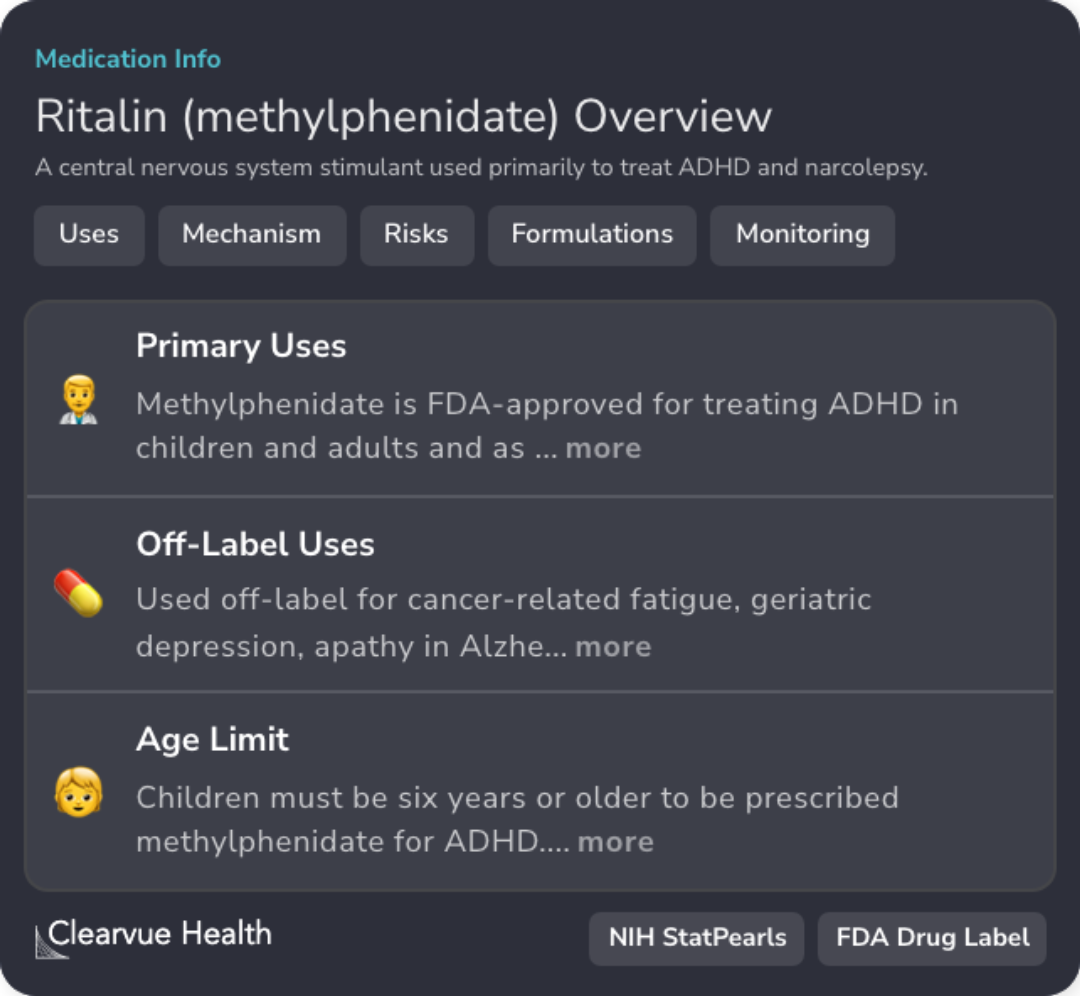
Study Summary
Methods
Researchers searched electronic databases up until February 2015 for studies comparing methylphenidate (Ritalin, Concerta) with a placebo or no treatment in children and adolescents diagnosed with ADHD. They focused on parallel and crossover randomized clinical trials. The quality of these studies was assessed using a method called GRADE. Ratings of ADHD symptoms and general behavior were provided by teachers, parents, and other observers.
Abstract: methods
Electronic databases were searched up to February 2015 for parallel and crossover randomised clinical trials comparing methylphenidate with placebo or no intervention in children and adolescents with ADHD. Meta-analyses and trial sequential analyses ...more

Study Summary
Results
The study included 38 parallel group trials with 5111 participants (median treatment duration 49 days) and 147 crossover trials with 7134 participants (14 days). The average age was 9.7 years. Methylphenidate (Ritalin, Concerta) showed a beneficial effect on teacher-rated ADHD symptoms in 19 parallel group trials, translating to a mean difference of -9.6 points on the ADHD rating scale. There was no evidence that it led to an increase in serious adverse events, but there was an increased risk of non-serious adverse events. Teacher-rated general behavior improved, and a meta-analysis of three trials indicated that methylphenidate might improve parent-reported quality of life. However, 96.8% of trials had a high risk of bias, and the quality of evidence was very low.
Abstract: results
The analyses included 38 parallel group trials (n=5111, median treatment duration 49 days) and 147 crossover trials (n=7134, 14 days). The average age across all studies was 9.7 years. The analysis suggested a beneficial effect of methylphenidate on ...more
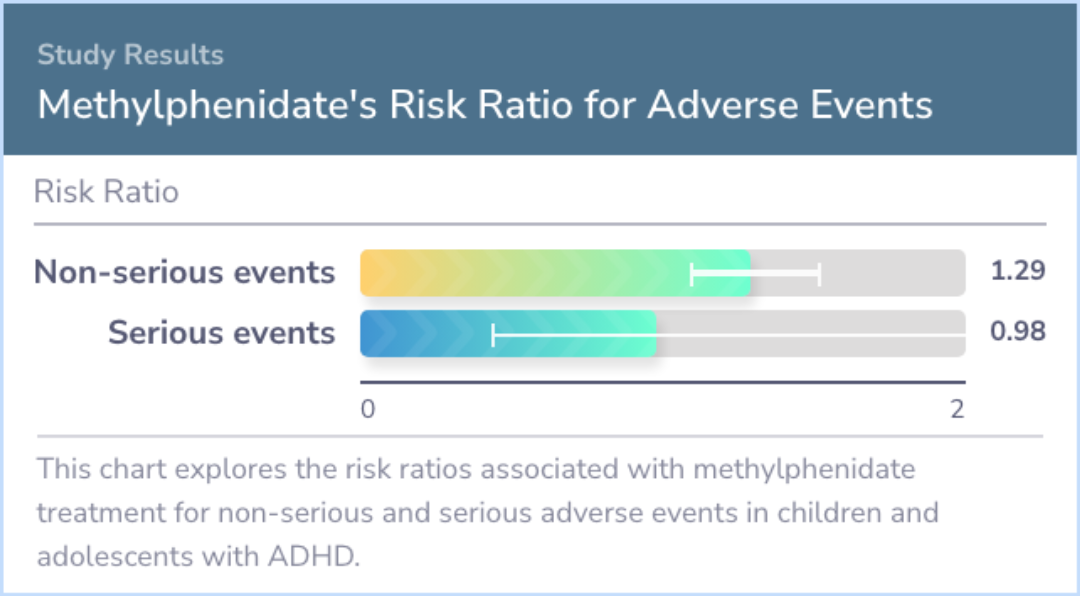
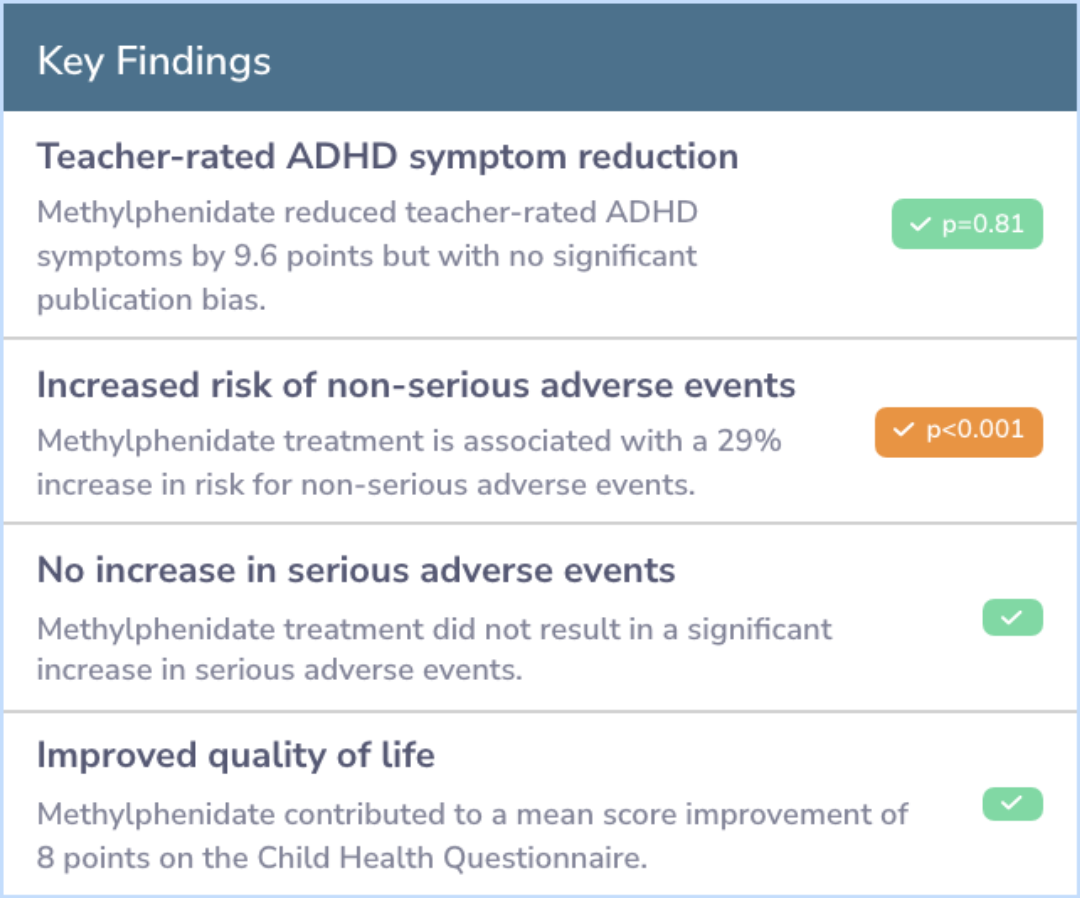
Study Summary
Conclusions
The study suggests that methylphenidate (Ritalin, Concerta) may help improve teacher-reported ADHD symptoms, general behavior, and parent-reported quality of life in children and adolescents with ADHD. However, due to the high risk of bias in many of the included trials and the low quality of the evidence, the exact magnitude of these effects remains uncertain. Additionally, methylphenidate is linked to an increased risk of non-serious adverse events but not serious ones.
Abstract: conclusions
The results suggest that among children and adolescents with a diagnosis of ADHD, methylphenidate may improve teacher reported symptoms of ADHD and general behaviour and parent reported quality of life. However, given the risk of bias in the included...more
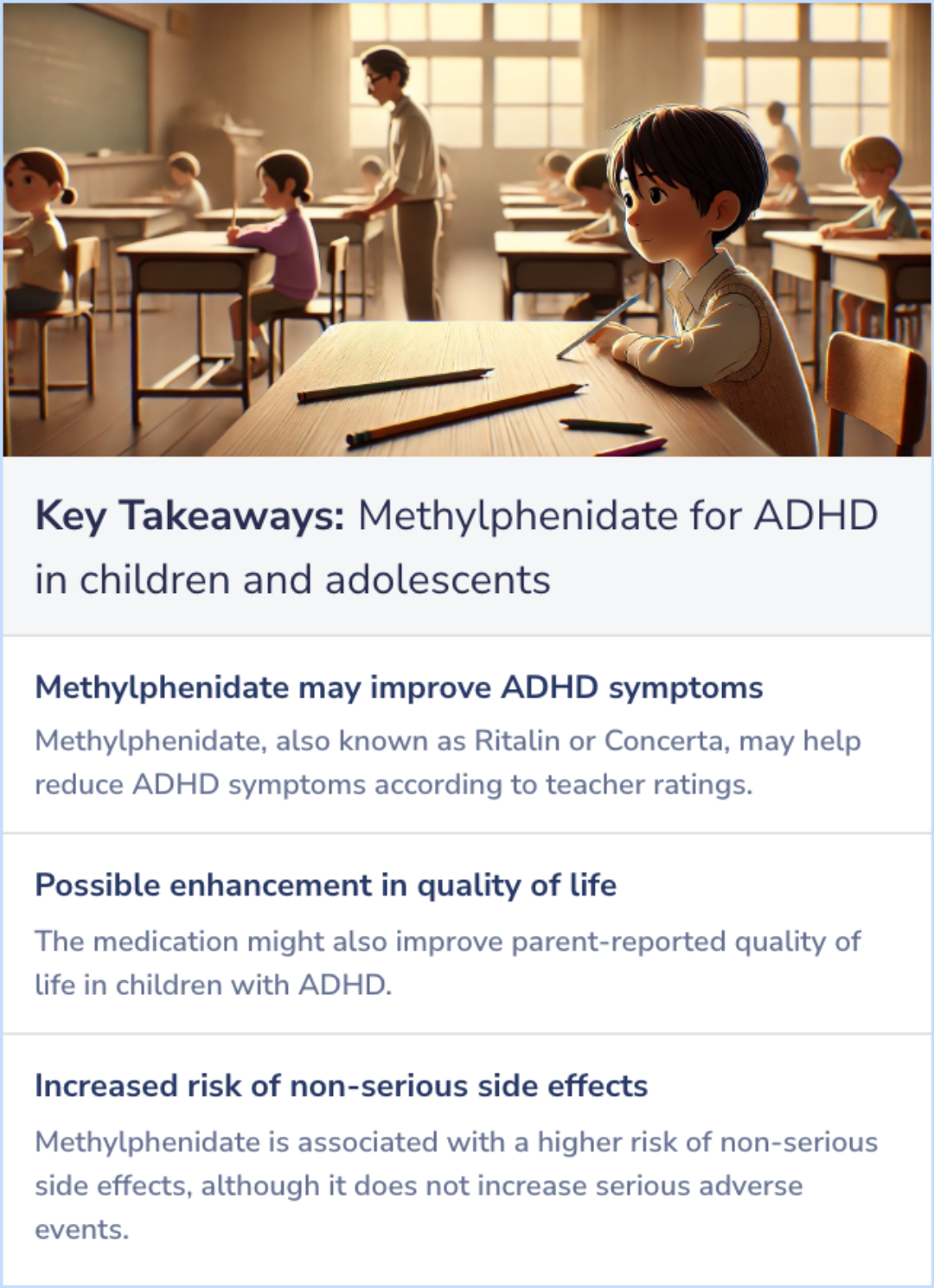
Professional Guide
Expert Opinion: Methylphenidate for ADHD in children and adolescents
The study's findings suggest that methylphenidate may improve teacher-reported ADHD symptoms and general behavior in children and adolescents.
Consistent with this, current professional guidelines recommend considering methylphenidate if behavioral interventions do not yield significant improvements, especially in moderate-to-severe cases.
However, clinicians should assess for symptoms of substance use before initiating medication, particularly in adolescents.
Stimulant medications, such as methylphenidate, show a high effect size in treating ADHD, and their efficacy can be enhanced with concurrent behavioral therapy.
Additionally, pediatricians are encouraged to engage in ongoing communication with school personnel to optimize care and monitor vital signs due to potential increases in heart rate and blood pressure.
Management of ADHD should follow chronic care principles, emphasizing the importance of structured, long-term management.
Consistent with this, current professional guidelines recommend considering methylphenidate if behavioral interventions do not yield significant improvements, especially in moderate-to-severe cases.
However, clinicians should assess for symptoms of substance use before initiating medication, particularly in adolescents.
Stimulant medications, such as methylphenidate, show a high effect size in treating ADHD, and their efficacy can be enhanced with concurrent behavioral therapy.
Additionally, pediatricians are encouraged to engage in ongoing communication with school personnel to optimize care and monitor vital signs due to potential increases in heart rate and blood pressure.
Management of ADHD should follow chronic care principles, emphasizing the importance of structured, long-term management.
Evidence Summary
Enhancing Organizational Skills in Children with ADHD
Children with ADHD often struggle with organizational skills needed for managing academic projects.
Organizational Skills Training (OST) helps improve these skills.
A review of 12 studies showed moderate to large improvements in organizational skills, as rated by teachers and parents.
Improvements in attention and academic performance were more modest.
Organizational Skills Training (OST) helps improve these skills.
A review of 12 studies showed moderate to large improvements in organizational skills, as rated by teachers and parents.
Improvements in attention and academic performance were more modest.
Evidence Summary
Improving Organizational Skills in ADHD
ADHD often affects organizational skills in children and adults, impacting their academic and work performance.
While medications like Ritalin can help, therapy and targeted interventions also show promise in improving these essential skills, especially among college students.
Therapy and new interventions focusing on teaching organizational and study skills have shown promise in helping college students with ADHD improve their organization and attention.
While medications like Ritalin can help, therapy and targeted interventions also show promise in improving these essential skills, especially among college students.
Therapy and new interventions focusing on teaching organizational and study skills have shown promise in helping college students with ADHD improve their organization and attention.
Evidence Summary
Comparing Treatment Options for ADHD in Children
The article reviews how well various treatments work for children diagnosed with ADHD by analyzing several studies.
Both medications and behavioral therapies were evaluated to observe their overall impact and effectiveness.
Researchers analyzed and compared previous studies to draw broad conclusions.
Both medication and behavioral therapies were evaluated in terms of their effectiveness.
Both medications and behavioral therapies were evaluated to observe their overall impact and effectiveness.
Researchers analyzed and compared previous studies to draw broad conclusions.
Both medication and behavioral therapies were evaluated in terms of their effectiveness.
